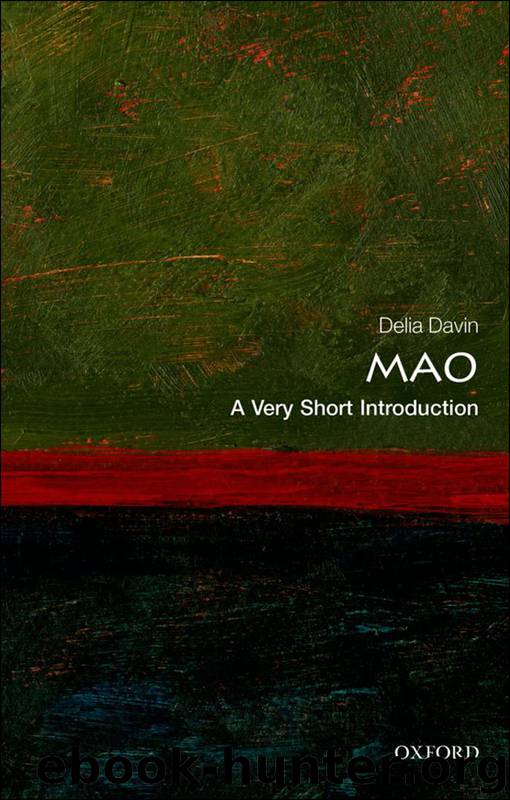Mao A Very Short Introduction by Delia Davin

Author:Delia Davin
Language: eng
Format: epub, mobi
Publisher: Oxford University Press
Published: 2013-12-11T16:00:00+00:00
Chapter 5
The Great Leap Forward and its aftershocks
Mao’s impatience with the pace of economic growth in China was increased by his second and final visit to the Soviet Union in November 1957. He obtained a promise of help with defence, and in particular nuclear technology, but it was made clear that other aid would be limited. Profound ideological differences began to emerge. Khrushchev stuck to the belief that he had expressed at the Soviet Party’s Twentieth Congress that there should be peaceful coexistence with capitalist countries, arguing that in a nuclear age even local wars were too dangerous as they might escalate into nuclear conflict. Mao insisted that liberation wars were still necessary and could be limited.
The Chinese position reflected an ongoing feeling of vulnerability. Much of the new industrial development in China had been sited at great expense far in the interior to put it beyond the reach, it was hoped, of US bombs. China faced unyielding hostility from the United States, the Americans had given Taiwan the latest military equipment, and the American trade embargo had excluded China from world markets. Reliant on the Soviet nuclear deterrent, China was alarmed by any indication that Moscow might be ‘going soft’ rather than standing up to Washington. The Russians were horrified by Mao’s bravado when he insisted that a nuclear war would not be a total disaster. Khrushchev’s return visit to Beijing in 1958 did nothing to heal the widening breach. Three weeks later, in brinkmanship which was perhaps intended as a lesson in anti-imperialist resolve for Moscow, the Chinese began shelling Guomindang-held islands in the Taiwan Straits. When a direct confrontation with the USA appeared to threaten, China backed down. After the conclusion of the crisis, belatedly in Chinese eyes, Khrushchev informed the USA that any attack on China would be regarded as an attack on the Soviet Union. Then in June 1959, the Soviets told the Chinese that they would not honour their promise to assist China with the development of a nuclear bomb because it would be contrary to their efforts to obtain a test ban treaty and bring about the relaxation of international tension. In 1959 and 1960 Mao was further infuriated by Moscow’s failure to support either Chinese action in Tibet or China’s stance in the Sino-Indian border dispute. The developing differences with the Soviet Union convinced Mao that China would have to depend more on its own efforts to industrialize and also inclined him to the belief that China should not slavishly follow the Soviet model. Mao revived the idea of an economic leap that he had first suggested in 1956. The Great Leap Forward was launched in the winter of 1957–8 with the aim of speeding up economic growth. Agricultural collectives were merged to make enormous new units called ‘People’s Communes’. Their size allowed them to mobilize tens of thousands of peasants in the winter months to work on construction projects. A huge expansion of irrigation was planned to protect against both flood and drought thus making farmland more productive.
Download
This site does not store any files on its server. We only index and link to content provided by other sites. Please contact the content providers to delete copyright contents if any and email us, we'll remove relevant links or contents immediately.
The Secret History by Donna Tartt(16681)
The Social Justice Warrior Handbook by Lisa De Pasquale(11495)
Thirteen Reasons Why by Jay Asher(7810)
This Is How You Lose Her by Junot Diaz(5805)
Weapons of Math Destruction by Cathy O'Neil(5058)
Zero to One by Peter Thiel(4841)
The Myth of the Strong Leader by Archie Brown(4797)
Promise Me, Dad by Joe Biden(4462)
Beartown by Fredrik Backman(4446)
How Democracies Die by Steven Levitsky & Daniel Ziblatt(4430)
Stone's Rules by Roger Stone(4427)
The Fire Next Time by James Baldwin(4357)
100 Deadly Skills by Clint Emerson(4095)
A Higher Loyalty: Truth, Lies, and Leadership by James Comey(4045)
Rise and Kill First by Ronen Bergman(4029)
The David Icke Guide to the Global Conspiracy (and how to end it) by David Icke(3900)
The Farm by Tom Rob Smith(3884)
Secrecy World by Jake Bernstein(3793)
The Doomsday Machine by Daniel Ellsberg(3743)
